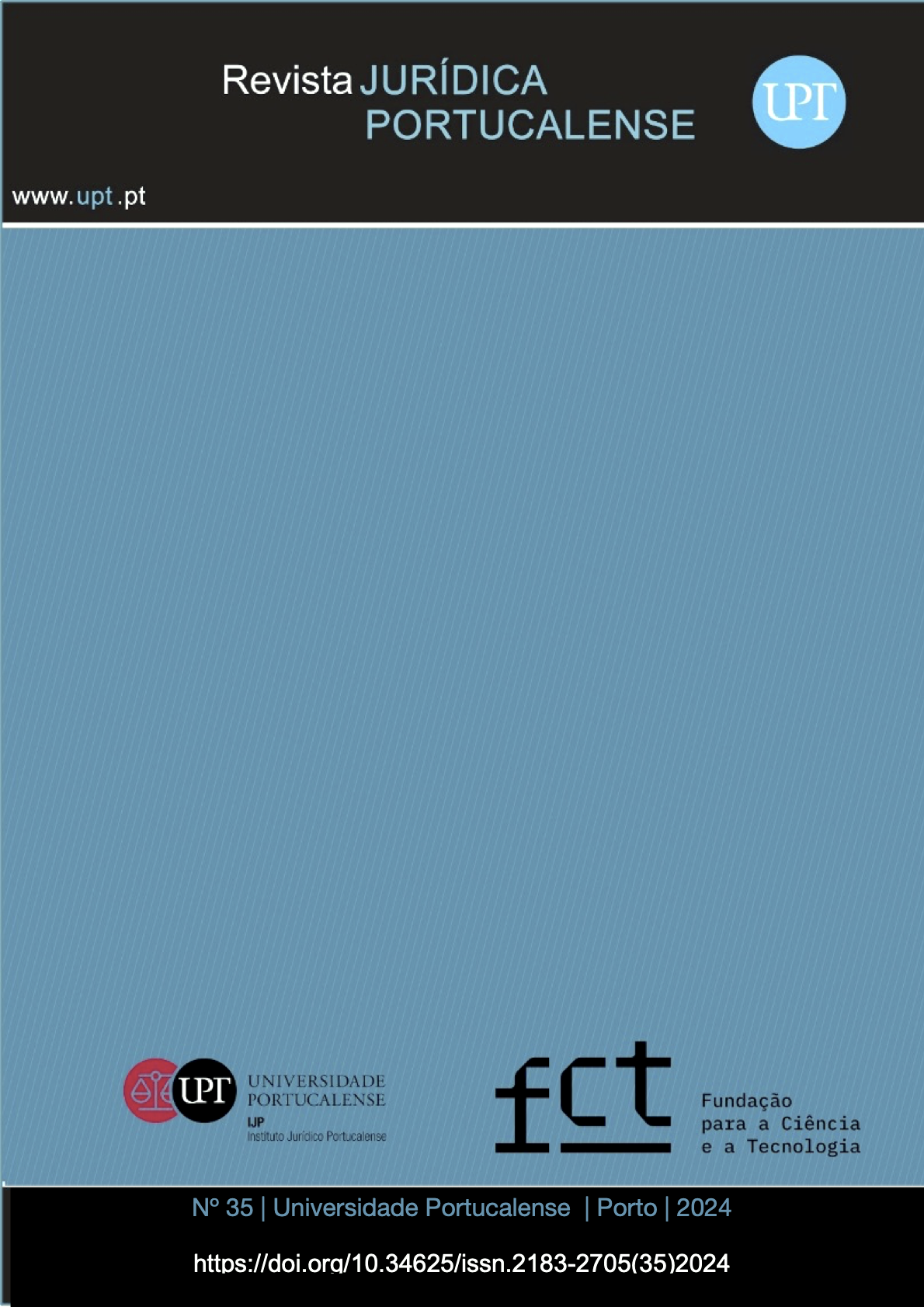Comentário do acórdão Correia de Matos c. Portugal do TEDH na perspetiva da discriminação de grupos profissionais
DOI:
https://doi.org/10.34625/issn.2183-2705(35)2024.jur-02Palavras-chave:
Tribunal Europeu dos Direitos Humanos; Convenção Europeia dos Direitos Humanos; direito a um processo equitativo; direito a auto-representação; princípio da não discriminação.Resumo
O presente comentário tem por objetivo analisar o contributo do juiz Paulo Pinto de Albuquerque, membro da Grande Secção, para o acórdão do Tribunal Europeu dos Direitos Humanos (TEDH) no caso Correia de Matos contra Portugal (queixa nº 56402/12), de 4 de abril de 2018. Neste processo, o requerente queixou-se da decisão dos tribunais nacionais portugueses de não o autorizarem a conduzir a sua própria defesa no processo penal contra ele instaurado e de exigirem que fosse representado por um advogado. O TEDH considerou, por nove votos a favor e oito contra, que não houve violação do artigo 6º, nºs 1 e 3, alínea c) (direito a um processo equitativo/direito a defender-se pessoalmente) da Convenção Europeia dos Direitos Humanos. O juiz Pinto de Albuquerque exprimiu uma opinião divergente. A questão central abordada é a discriminação de grupos profissionais, ou seja, a posição da legislação portuguesa que impossibilita a auto-representação em processos penais.
Referências
Christopher Gray, “The right to defend oneself in person in criminal proceedings: Correia de Matos v. Portugal”, European Human Rights Law Review, vol. 4, 2018, pp. 393-396.
Comité dos Direitos Humanos, Comentário Geral n.º 32, “Artigo 14.º Direito à igualdade perante os tribunais de justiça e a um julgamento justo”, CCPR/C/GC/32, 23 de agosto de 2007.
Comité dos Direitos Humanos, Correia de Matos c. Portugal, comunicação n.º 1123/2002, 28 de março de 2006.
Comité dos Direitos Humanos, Observações finais sobre o quarto relatório periódico de Portugal, adotadas pelo Comité dos Direitos Humanos na sua 106ª sessão (15 de outubro-2 de novembro de 2012), CCPR/C/PRT/CO/4, 23 de novembro de 2012.
Conselho da Europa/TEDH, Guide sur l’article 6 de la Convention européenne des droits de l’homme : droit à un procès équitable (volet pénal), 2022.
Dorothea Staes, “Correia de Matos v. Portugal: fragmented protection of the right to defend oneself in person”, Strasbourg Observers, 24 de maio de 2018.
Hugues Diaz, “Droit ou obligation d’être défendu par un avocat ?”, Dalloz, 30 de abril de 2018.
Jurisprudência do Tribunal Europeu dos Direitos Humanos: sumários, Centro de Estudos Judiciários, Lisboa, 2020.
Tayrone Marquesini Chiavone, “Riscos à privacidade v. riscos à segurança pública, um dilema a ser superado na sociedade de risco (digital). Comentários ao voto parcialmente dissidente do Juiz Pinto de Albuquerque no caso Big Brother Watch and Others v. The United Kingdom”, Revista Jurídica Portucalense, vol. 35, 2024, pp. 1-11.
TEDH, Correia de Matos c. Portugal, queixa nº 48188/99, decisão final sobre a admissibilidade, 15 de novembro de 2001.
TEDH, Tribunal Pleno, Correia de Matos c. Portugal, queixa nº 56402/12, acórdão de 4 de abril de 2018.
Thomas Kleinlein, “The procedural approach of the European Court of Human Rights: between subsidiarity and dynamic evolution”, International & Comparative Law Quarterly, vol. 68, 2019, pp. 91-110.
Downloads
Publicado
Como Citar
Edição
Secção
Licença
Direitos de Autor (c) 2024 Revista Jurídica Portucalense

Este trabalho encontra-se publicado com a Licença Internacional Creative Commons Atribuição 4.0.
Autores que publicam nesta revista concordam com os seguintes termos:
- Autores conservam os direitos de autor e concedem à revista o direito de primeira publicação, com o trabalho simultaneamente licenciado sob a Licença Creative Commons Attribution que permite a partilha do trabalho com reconhecimento da autoria e publicação inicial nesta revista.
- Autores têm autorização para assumir contratos adicionais separadamente, para distribuição não-exclusiva da versão do trabalho publicada nesta revista (ex.: publicar em repositório institucional ou como capítulo de livro), com reconhecimento de autoria e publicação inicial nesta revista.
- Autores têm permissão e são estimulados a publicar e distribuir o seu trabalho online (ex.: em repositórios institucionais ou na sua página pessoal) a qualquer ponto antes ou durante o processo editorial, já que isso pode gerar alterações produtivas, bem como aumentar o impacto e a citação do trabalho publicado (Veja O Efeito do Acesso Livre).
A RJP não aplica taxas de submissão, publicação ou de qualquer outra natureza, sendo os artigos publicados em acesso livre e aberto, com a missão de difusão do conhecimento científico e o debate de temas jurídicos na área das Ciências Jurídicas.






